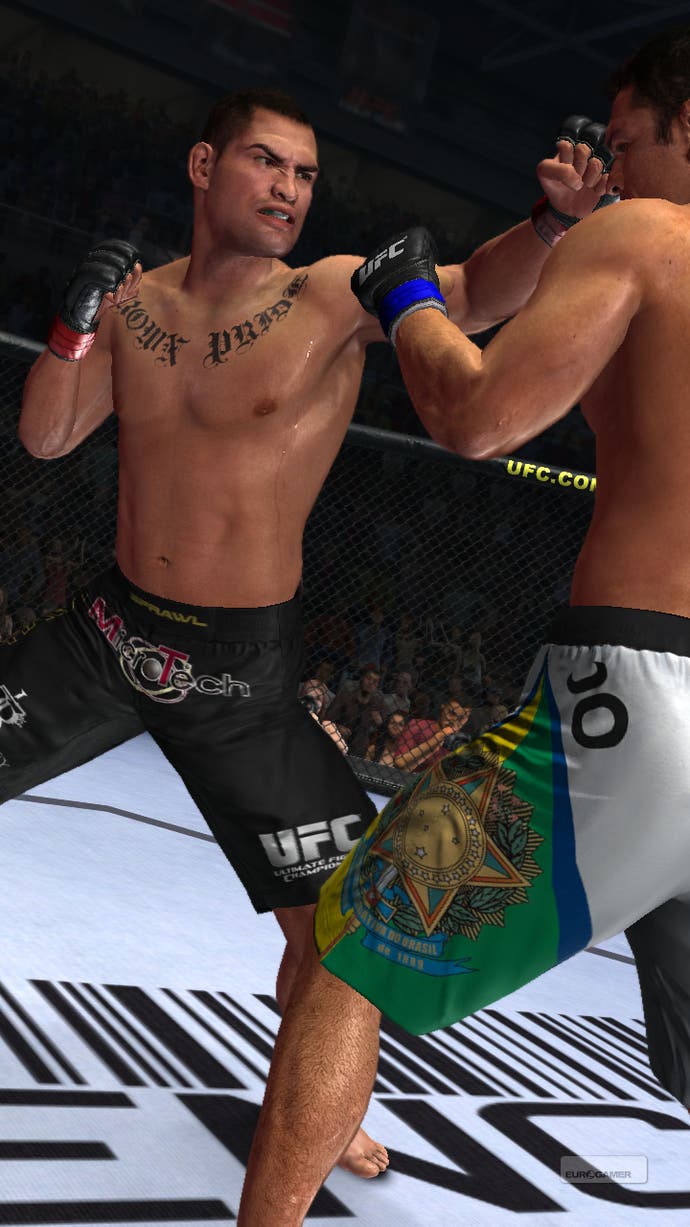UFC 2010: Undisputed
Second's out.
Using videogames to simulate and therefore predict real-life sporting events can be a hubristic business. Already this year I've watched John Terry lift the World Cup for England, courtesy of the 2010 FIFA World Cup team. And hasn't that turned out well so far?
Two days ahead of UFC 111 in New York City, the headline face-off between much-fancied Canadian bruiser - and current welterweight champ - Georges St. Pierre, and mohawked Midlander Dan Hardy, is unfolding in high definition on a cinema screen in downtown Manhattan.
The general feeling is Hardy's stand-up game gives him an outside shot at an upset, but if the clash goes to ground (likely), wrestling master GSP, as he's known, will simply overwhelm the British underdog. As it transpires on-screen, Hardy is KO'd in round two by a devastating roundhouse to the chops, leaving him sparked out on the canvas.
UFC 2009: Undisputed was a pivotal release both for fighting organisation and publisher. The UFC needed a decent game to help drive the popularity of MMA and erase memories of previous feeble efforts. And THQ needed to prove it could do something other than WWE.
Positive reviews and four million sales later and a successful franchise is born which, if not the "beginning of the rebirth of THQ" as is suggested during the presentation, is clearly a strong foundation upon which to exploit and expand the rapid growth of the sport.
"Certainly, I think the UFC recognises how important the videogame is from an education standpoint," says producer Nevin Dravinski. "We're educating a whole slew of people that would maybe never be exposed to the UFC.

"Some of the biggest compliments I've gotten have been from people who say, 'I love your game', and I say, 'Oh, are you a big UFC fan?' 'No, but now I am because I played the game and know all these people as a result'."
In business as in sport, success breeds confidence and the showcase for UFC 2010 is carried out with a swagger and self-assurance that contrasts sharply with the edgy optimism of the previous year's event.
Then, a hotel suite presentation in Vegas with Forrest Griffin and Rampage Jackson was relatively low-key, relaxed and big on 'vision'. Now, following a lengthy, live theatre presentation, press are shipped to a setting much more in-tune with the pizzazz and intensity of a live UFC event.
Giant screens loop highlights of classic UFC fights while below PS3s and flatscreens with playable code fill the dancefloor. Dana White rocks up with a bevy of man-beasts, including injured heavyweight champ Brock Lesnar, taking it in turns to pile on the superlatives under the spotlight and play the game as media teams jostle for the best vantage points. Chaos.
It's all preposterously entertaining and an impressive statement of intent, illustrating the potential the UFC sees in the game not least as a marketing tool for MMA.
"They recognise we did make a good game," says Dravinski of the show of support. "Dana pulls no punches, he's very quick to mention how bad the previous games were." ("They sucked" is White's preferred formulation). Dravinski adds: "Making videogames is hard and making an MMA game is really hard. It's incredibly difficult from a technical standpoint."


